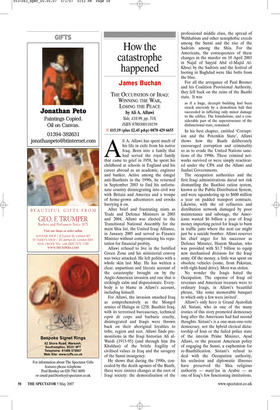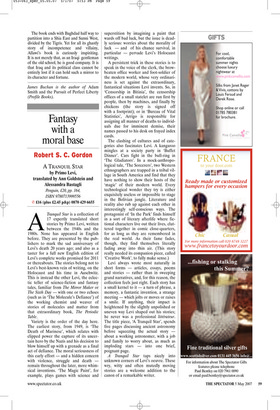How the catastrophe happened
James Buchan
THE OCCUPATION OF IRAQ: WINNING THE WAR, LOSING THE PEACE by Ali A. Allawi Yale, £18.99, pp. 518, ISBN 9780300110159 ✆ £15.19 (plus £2.45 p&p) 0870 429 6655 Ali A. Allawi has spent much of his life in exile from his native Iraq. Born into a family that had served the royal family that came to grief in 1958, he spent his childhood at schools in England and his career abroad as an academic, engineer and banker. Active among the émigré anti-Baathists in the 1990s, he returned in September 2003 to find his unfortunate country disintegrating into civil war with Britain and America and a troupe of home-grown adventurers and crooks hurrying it on.
After brief and frustrating stints as Trade and Defence Ministers in 2003 and 2004, Allawi was elected to the Transitional National Assembly for the main Shia list, the United Iraqi Alliance, in January 2005 and served as Finance Minister without compromising his reputation for financial probity.
Allawi refused to live in the fortified Green Zone and his ministerial convoy was twice attacked. He left politics with a whole skin last May. He has written a clear, unpartisan and literate account of the catastrophe brought on by the Anglo-American invasion and one that is strikingly calm and dispassionate. Everybody is to blame in Allawi’s account, including himself.
For Allawi, the invasion smashed Iraq as comprehensively as the Mongol armies of Hulagu in 1258. Baathist Iraq, with its terrorised bureaucracy, technical esprit de corps and barbaric cruelty, disintegrated and Iraqis were thrown back on their aboriginal loyalties to tribe, region and sect. Allawi finds premonitions in the Iraqi historian Ali alWardi (1913-95) (and through him ibn Khaldun) of the brittle fragility of civilised values in Iraq and the savagery of the Sunni insurgency.
He shows that during the 1990s, concealed by the death agonies of the Baath, there were sinister changes at the root of Iraqi society: the demoralisation of the professional middle class, the spread of Wahhabism and other xenophobic creeds among the Sunni and the rise of the Sadrists among the Shia. For the Americans, the consequences of these changes in the murder on 10 April 2003 in Najaf of Sayyid Abd el-Majid AlKhoei by the Sadrists and the festival of looting in Baghdad were like bolts from the blue.
For all the arrogance of Paul Bremer and his Coalition Provisional Authority, they fell back on the ruins of the Baathi state. It was
as if a huge, decrepit building had been struck unevenly by a demolition ball that succeeded in inflicting only minor damage to the edifice. The foundations, and a considerable part of the superstructure of the disfunctional state, remained.
In his best chapter, entitled ‘Corruption and the Potemkin State’, Allawi shows how the Baath deliberately encouraged corruption and criminality so as to evade the United Nations sanctions of the 1990s. These criminal networks survived or were simply reactivated under the CPA and the Allawi and Jaafari Governments.
The occupation authorities and the first Iraqi administrations dared not risk dismantling the Baathist ration system, known as the Public Distribution System, and were squandering up to $600 million a year on padded transport contracts. Likewise, with the oil refineries and distribution network damaged by poor maintenance and sabotage, the Americans wasted $6 billion a year of Iraqi money importing petrol for Iraqis to burn in traffic jams where the next car might just be a suicide bomber. Allawi reserves his chief anger for his successor as Defence Minister, Hazem Shaalan, who was provided with $1.7 billion to equip new mechanised divisions for the Iraqi army. Of the money, a little was spent on obsolete vehicles (some, from Pakistan, with right-hand drive). Most was stolen.
No wonder the Iraqis hated the Occupation. The expense of Iraqi oil revenues and American treasure were to ordinary Iraqis, in Allawi’s beautiful phrase, ‘like some memorable banquet to which only a few were invited’.
Allawi’s only hero is Grand Ayatollah Ali Sistani, who in one of the many ironies of this story promoted democracy long after the Americans had had second thoughts. Sistani’s is a one-man-one-vote democracy, not the hybrid clerical dictatorship of Iran or the failed police state of the interim Prime Minister, Ayad Allawi, or the present American policy of engaging the Sunni, a euphemism for re-Baathification. Sistani’s refusal to deal with the Occupation authority, his seclusion and diplomatic illnesses have preserved the Shia religious authority — marji’iya in Arabic — as one of Iraq’s few functioning institutions. The book ends with Baghdad half way to partition into a Shia East and Sunni West, divided by the Tigris. Yet for all its ghastly story of incompetence and villainy, Allawi’s book is curiously inspiriting. It is not merely that, as an Iraqi gentleman of the old school, he is good company. It is that Iraq and its political class cannot be entirely lost if it can hold such a mirror to its character and fortune.
James Buchan is the author of Adam Smith and the Pursuit of Perfect Liberty (Profile Books).



































































































 Previous page
Previous page